Navigation
Install the app
How to install the app on iOS
Follow along with the video below to see how to install our site as a web app on your home screen.
Note: This feature may not be available in some browsers.
More options
You are using an out of date browser. It may not display this or other websites correctly.
You should upgrade or use an alternative browser.
You should upgrade or use an alternative browser.
rhf
-

New ESV Calcium Chloride source?
Hi all! I've been using ESV Calcium Chloride for ages, following RHF 2-part's recipe. BRS no longer carries the ESV Calcium Chloride it seems. They do carry their own dry Calcium Chloride product... A. Where is everyone purchsing ESV now? B. Or are you using a different product? If so...- Lylelovett
- Thread
- alkalinity calcium chloride esv rhf
- Replies: 2
- Forum: Reef Chemistry by Randy Holmes-Farley
-

Baking baking soda - making soda ash - RHF Recipe - ???
I am following the instructions for Recipe #1, Part 2: The Alkalinity Part When it says to cook 594g of baking soda - how many grams of the resulting soda ash should I be using? A. 594g of soda ash? B. Or the amount that 594g of baking soda cooked down to? In my case it looks like it cooked...- Lylelovett
- Thread
- baking soda rhf soda ash
- Replies: 7
- Forum: Reef Chemistry by Randy Holmes-Farley
-
S
Can low PH artificially influence Alkalinity test kit results?
Question: After seeing some suspiciously low alkalinity readings on a new Red Sea pro test kit, I started thinking about some of the RHF articles I'd previously read on the topic. Specifically: That explanation of how standard alkalinity test kits work seems to be mirrored many places across...- senorpyro
- Thread
- alkalinity c02 rhf
- Replies: 12
- Forum: Reef Chemistry by Randy Holmes-Farley
-
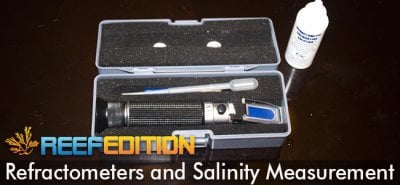
Refractometers And Salinity Measurement
Salinity is one of the most important parameters measured in reef aquaria. It controls not only the salt balance between an organism and its surrounding environment, but also the levels of a host of ions in seawater that aquarists neither measure nor control independently. Consequently...- Randy Holmes-Farley
- Article
- 31 min read
- chemistry randy holmes-farley reef chemistry reef tank refractometer rhf salinity saltwater saltwater aqarium
- Category: Reef Chemistry
-
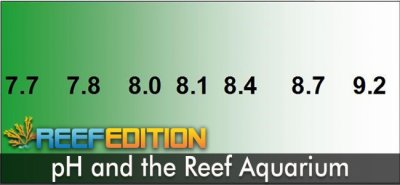
pH And The Reef Aquarium
For many aquarists, pH is not something that they have much experience with aside from their aquarium. For many, pH is almost a black box measurement: something to be considered, but whose physical meaning makes little sense to them. This article will describe pH in an intuitive way (as...- Randy Holmes-Farley
- Article
- 23 min read
- alkalinity randy holmes-farley reef aquarium reef chemistry reef tank rhf saltwater saltwater aqarium
- Comments: 2
- Category: Reef Chemistry
-
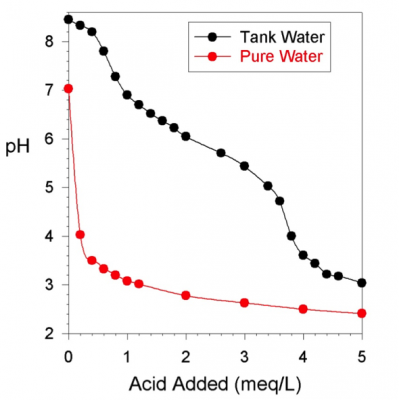
What is Alkalinity?
Most reefkeepers know they need to measure alkalinity, and most know it has something to do with carbonate. But what is alkalinity exactly? Why is it important? How is it measured? This article will answer those questions and give you all of the information that you need to fully understand one...- Randy Holmes-Farley
- Article
- 14 min read
- alk alkalinity randy holmes-farley reef aquarium reef chemistry reef tank rhf saltwater saltwater aqarium
- Category: Reef Chemistry
-
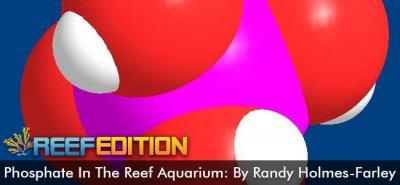
Phosphate in the Reef Aquarium
The phosphorus atom is one of living matter’s basic building blocks. It is present in every living creature and in the water of every reef aquarium. Unfortunately, it is often present in excess in reef aquaria and that excess has the potential to cause at least two substantial problems for...- Randy Holmes-Farley
- Article
- 29 min read
- phosphate po4 randy holmes-farley reef aquarium reef chemistry reef tank rhf saltwater saltwater aqarium
- Comments: 1
- Category: Reef Chemistry
-
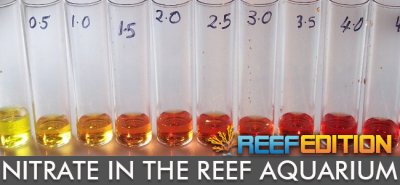
Nitrate in the Reef Aquarium
Introduction Nitrate is an ion that has long dogged aquarists. It is typically formed in aquaria through the digestion of foods, and in many aquaria it builds up and can be difficult to keep at natural levels. In the past, many aquarists performed water changes with nitrate reduction as one of...- Randy Holmes-Farley
- Article
- 23 min read
- nitrate randy holmes-farley reef reef aquarium reef chemistry reef tank rhf saltwater saltwater aqarium
- Comments: 1
- Category: Reef Chemistry












